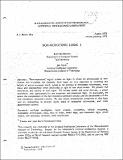| dc.description.abstract | "Non-monotonic" logical systems are logics in which the introduction of new axioms can invalidate old theorems. Such logics are very important in modeling the beliefs of active processes which, acting in the presence of incomplete information, must make and subsequently revise predictions in light of new observations. We present the motivation and history of such logics. We develop model and proof theories, a proof procedure, and applications for one important non-monotonic logic. In particular, we prove the completeness of the non-monotonic predicate calculus and the decidability of the non-monotonic sentential calculus. We also discuss characteristic properties of this logic and its relationship to stronger logics, logics of incomplete information, and truth maintenance systems. | en_US |
